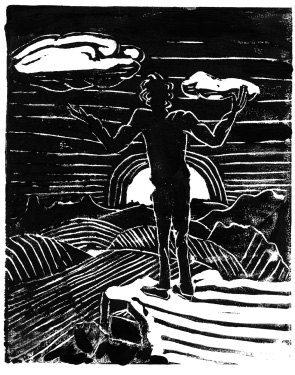
Could it be that it is less important to know which question goes first than to know which one goes last—the ultimate question? If whoers are gossips, wheners impatient, whyers dreamers, where-ers lost, and howers pragmatists, is it the whaters who cut to the heart of things? What am I talking about? What is this book? What is a book? Isn’t “what is writing?” a more fundamental question than George Orwell’s when he asked why he wrote? Doesn’t what usually trump why?
What is at the heart of intellectual pursuit? Is it “what?”? If so, shouldn’t the first sentence of this paragraph be read as a statement? Some might say that “why?” is the root question of science, but isn’t the scientific why just the hypothesis that leads to answering the real goal of science, which is “what?”? Isn’t this similar to the way history appears to be about “when?” while it is ultimately, again, about “what?”? If the questions at “the irreducible core to a story about the past” according to historian Margaret MacMillan are “What happened and in what order?”—then doesn’t this mean we really want to know “what?”?
When Marcus Garvey wanted to completely change the history and image of black people, didn’t he choose to title his essay: “Who and What is a Negro?”? Does this mean that “who?” in the hands of a revolutionary also leads, then, to “what?”?
Wouldn’t you think a poet would be a whyer? Then why was the great Spanish poet Federico García Lorca such a chronic whater? Why does that Spanish word qué keep turning up at the beginning of his sentences? Does he not ask the fundamental poet’s question when he wrote, “What is the use, I wonder, of ink, paper and poetry?”? When a dying ant sadly declares, “I have seen the stars,” what do the other ants reply? “Qué son las estrellas?” What are stars? Why, for that matter, do snails, such a rudimentary, basic animal, keep appearing in his poems? Why did he write: “They have brought me a snail. / Inside it sings / a map-green ocean”? And why describe autumn: “With small white snails”? Was García Lorca a whater because he questioned basic, fundamental things? Isn’t that a whater for you? Did that make him a dangerous man? Is that why Franco, fighting to establish a fascist dictatorship, had him murdered? If it seems clear that police states don’t like questioners, are they especially distrustful of whaters?
Didn’t Langston Hughes in a 1951 poem predict decades of urban uprisings by asking what? “What happens to a dream deferred?”
Wasn’t José Martí, who was the father of Cuban independence and a true rebel, also a great whater? Didn’t he ask, in an article praising another rebel, Ralph Waldo Emerson, “For what man who is master of himself does not laugh at a king?”? Is this not a dangerous man? What did he ask his general, Máximo Gómez, whom he feared had dreams of a military dictatorship? “What are we, General?” What? “Are we the heroic modest servants of an idea that fires our hearts, the loyal friends of a nation in distress? Or are we bold and fortune-favored caudillos who with whip in hand and spurs on our heels prepare to bring war to a nation in order to take possession of it ourselves?” What?
Why is the question “what?” so fundamental? What is it about “what?”? What happens when Jean-Anthelme Brillat-Savarin, in his great early nineteenth-century book on food, The Physiology of Taste, asks a question: “Are truffles digestible?”? Isn’t that a good question to ask before eating a truffle? But is it as fundamental as his earlier question: “What is meant by food?”?
Isn’t an even more fundamental food question: “What is it?”? Why do you hear this all the time in Israeli food stores? “Mah ha zeh?” “What is it?” And why is the answer always another question: “Mah?”?
“What is it?”
“What?”
Are Israelis intrinsically whaters? Are they people who question fundamentals? Is the most ubiquitous question the most important question, and if so, doesn’t this mean that Israelis believe that the most important question is “what?”? Could this be why they walk around all day repeatedly saying, “Mah? Mah?”? “What? What?”
Does such questioning get us anywhere? Or is “what?” not a question at all but a statement? Or do they just think “what?” is the first question? Then why do they not move on? Is it because “what?” has not been adequately answered?
Isn’t the important question: “Why?”? But doesn’t that just leave us open to the Talmudic answer: “Why not?”? Is that just the negative version of the same question? Or is it the positive version? Do Israelis prefer to ask “what?” because they know even the Talmud can’t reverse that one on them the way it can “why?”?
“How do I explain all this?”